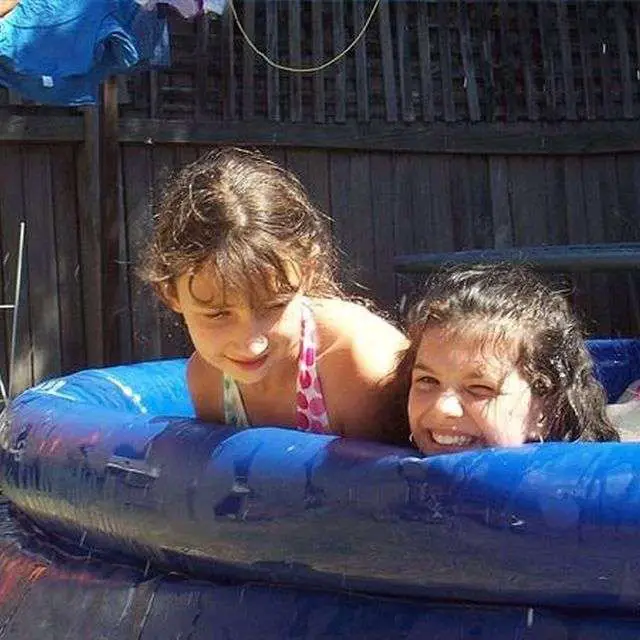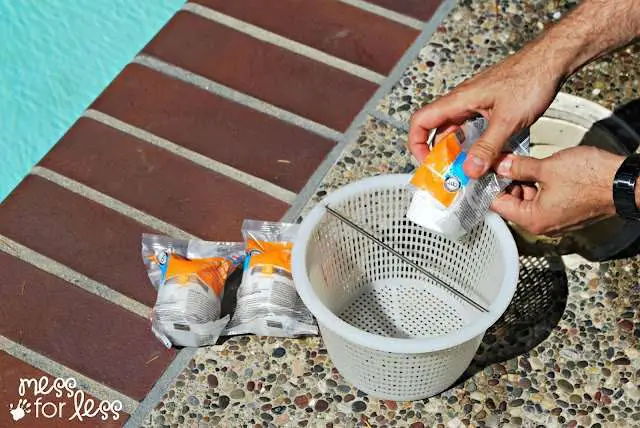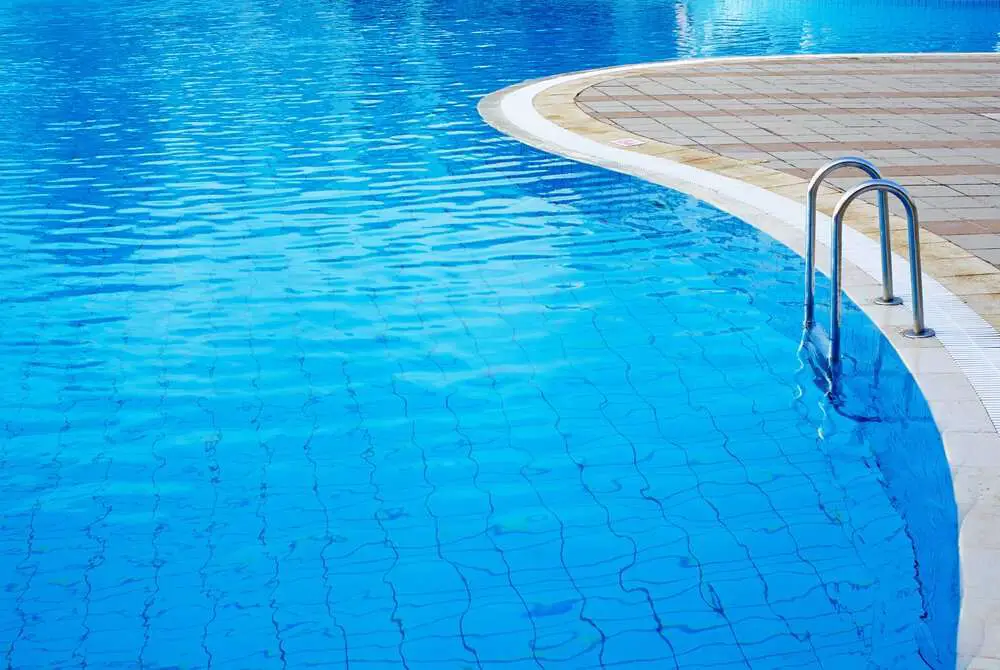How To Keep Kiddie Pool Water Clean Use Chlorine
You may be surprised to know that you can use chlorine for kiddie pools! In small quantities of course, chlorine tablets are great to fight bacteria and algae in your baby pool.
Chlorine is a natural chemical element. It is one of the most potent elements we have to destroy and deactivate infections, viruses, and other illness-causing bacteria, according to the American Chemistry Council. Weve been using it for over 150 years, and its one of the only things that can be used to fight things like E. Coli and Salmonella.
You can use small chlorine tabs that are meant for a spa tub or small pools. They are 1 in size and you can use these chlorine tablets for kiddie pools. These should only be used in pools that hold 100 or more gallons of water.
You should use one tablet per week for a kiddie pool of 200 gallons or less, and two tablets weekly for kiddie pools of over 200 gallons.
An additional benefit of using chlorine in the kiddie pool is to prevent mosquitoes from laying eggs in the pool.
The correct way to use these chlorine tabs in your kiddie pool is to use a chlorine float dispenser. The dispenser below will hold one or two tablets and you simply let it float in the pool when the kids are not using it. Do NOT just throw the tablets directly into the pool.
Keep Your Filter Clean For Optimal Filtering Performance
There are three major parts to keeping your pool clean:
- Manual pool maintenance
- Chemical sanitizing and balancing
- Automatic filtration
When you have a pool filter, cleaning your pool is WAY easier. It cuts down on a lot of the time youd normally spend skimming and vacuuming, which is always a plus.
But in order for a filter to maintain peak performance, it needs to stay clean. Because over time, after weeks and weeks of filtering your water, your pool filter starts to clog up with debris. From visible strands of hair to microscopic grains of dirt, sand, and other contaminants.
Point being, if you want to keep your physical pool cleaning duties to a minimum, the best strategy is keeping your pool filter clean.
So whether you have a sand or cartridge filter, the important part is making sure you clean it out before it gets too dirty.
For the best results:
- Clean cartridge filters once a month
- Replace your cartridge filters each year
Test The Kiddie Pool Water Regularly
After the first day of leaving the chlorine dispenser in the water, make sure you test the water.
This will let you know if you need to adjust the dispenser for more chlorine, or if a different water chemical level is off.
Speaking from personal experience, the pH and alkalinity shouldnt be too off when youre filling from a hose to your small kiddie pool.
If your pH and alkaline levels are way off, either extremely high or extremely low, youre going to want to balance those out. Be cautious, because with such a small body of water, you wont need to use much chemicals to balance out the water.
Low pH can cause swimmers eyes to sting, skin to itch, and wont let chlorine do its job.
High pH can also cause those effects, as well as wear and tear on swimwear and goggles.
After all of this, you might still be wondering
Also Check: Does The Tropicana Have An Indoor Pool
Cleaning Childrens Swimming Pool
Believe it or not, distilled white vinegar is great for keeping a kids swimming pool clean. Daily add distilled white vinegar and simply mix it by hand.
The amount of vinegar to be applied to the pool will depend on the size of the pool. Half a cup of distilled white vinegar is enough for a small size childrens pool and 1 and a half cups for larger childrens pool.
Vinegar is a natural weed and plant killer, which is essential for you to remember. The distilled white vinegar may be best for cleaning a childrens pool, but this is not advised to be watered or reused for plants. Upon using this technique, place the pool in a place where you dont mind if the grass or plant gets killed.
Ultraviolet Pool Sanitizing Light

Ultraviolet sanitation is a powerful disinfection method that uses short-wavelength UV light to kill or inactivate microorganisms by disrupting their DNA. UV light destroys cysts, algae, viruses, bacteria, and protozoa, and even kills pathogens that are chlorine-resistant, such as E. Coli, Giardia, Cyclospora, and Cryptosporidium.
You May Like: Removing Calcium Nodules In Pool
Essential Steps To Treat Water In An Inflatable Pool
Here, we are explaining the basic steps of cleaning and sanitizing your pool. We’ll show you how to use chlorine, which is the commonest water bleach and sanitizer. Any measurements we give here are for the explanation.
Moreover, we advise that you use the recommended measurements of your pool. They exist in different types and sizes, so the amounts vary.
A Beginners Guide To Pool Maintenance
Your swimming pool needs regular upkeep. Thats why it pays to develop a strong basic understanding of pool maintenance essentials.
When you know how your pool works, the best ways to care for it, and how to plan for it, youll be ready to solve just about any potential pool problem that floats your way.
Also Check: How Do I Remove Calcium Deposits From My Pool
The Natural Swimming Pool: A Pool Without Chemicals
If you want to take it a step further, you can build at home a natural pool. This is a great solution for those of you who are trying to make money savings because maintaining your pool with chemical-free methods is costly. This type of pool does not use any chemical or other free-chemical solutions: clean water is provided by a natural process of water filtration by plants.
Keep The Pool Covered When Not In Use
The first thing to remember is to keep the pool covered. It sounds obvious, but effective covering makes keeping the pool clean immeasurably easier. If dirt doesnt get in there in the first place then thats a large part of the battle already won.
A variety of pool covers are available, from electrically powered to more eco-friendly hand-operated options.
You May Like: Why Is My Dolphin Pool Cleaner Floating
Keep Pool Cleaned And Covered
The last step is to simply clean out any dirt and debris that has built up inside the pool. The filter pump should take care of most of this, but it wont get everything. Keeping dirt, leaves, and other debris out of the pool will allow the chlorine to do its job better, and last longer.
Keeping the pool covered will help the chlorine last longer as well. Chlorine can be eaten away or burnt up by the sun. Covering the pool when its not in use can extend how long your chlorine works, and reduce your maintenance time and costs.
In Times Of Heavy Rain How Is Your Pool Water Affected And More Importantly What You Can Do About It
The rain can definitely have an adverse effect on your swimming pool water, though it may come as a surprise that the problems caused by rain are not a result of the ‘dilution’ of the chemicals in your pool. An inch of rainwater added to a typical 50,000 litre pool increases the amount of water by only about 1.5%, meaning dilution is not usually an issue.
It’s more about what comes into the pool with the rain. Rain delivers algae spores, which are usually present in the air airborne debris to pool water and it is these things that cause problems. When it rains, these spores and other material in the air above a swimming pool get washed into the water.
All of this material reacts with your pool chlorine and so reduces the active chlorine level in the water. Combined with this, when the organic matter decomposes it provides fuel for the growth and reproduction of algae and other simple organisms in the water.
Combined with sunlight, especially in warmer water, the conditions become perfect for the accelerated growth of algae in the pool.
When you have rainwater coming off your landscape or deck, you also have an added source of water and debris to deal with.
When rainwater and run off enter the pool, they can change your waters pH, calcium hardness, total dissolved solids , alkalinity, and other chemical levels as well as bring contaminants such as dirt and debris into the pool.
You May Like: Is The Mandalay Bay Pool Open
Cover The Kiddie Pool When Its Not In Use
Even though Intex sells a kiddie pool cover thats made for our particular pool of choice. I pass on it every year, because Ive got tons of tarps and stakes and bungee cords. My sad, DIY kiddie pool covers keep most of the bugs, twigs, and other large debris but theyre worthless against rain. And rain is the number one contributor to the pool water turning into a stagnant, fetid algae factory.
So this year, Im ordering the cover at the same time I order the pool, and Ima put it on every single night.
Things You May Not Have Thought About

If you can establish a good routine that includes these tips, youll be enjoying your pool for years to come. For more pool cleaning tips, read our article on 12 tricks you may not have thought of.
Recommended Reading: Diy Inground Pool Cost
The Basic Components Of A Swimming Pool
Like most major home improvements, you can get as fancy as you like with your swimming pool. You can add advanced heating and lighting, install high-tech pool covers, and even enjoy music while you swim with underwater pool speakers. But whether you have a basic backyard pool or a massive inground oasis shaped like Elvis, every pool has four components that need regular care to keep the good times rollin.
These include:
- The pools interior wall or liner
- The pools filter system
- The pools system of skimmers and returns
Soak Up The Sunscreen And Bodily Oils
I just saw a program on the tee vee about this enormous sponge that soaks up crude oil above and below the water after a catastrophic spill.
This Scumbug oil-sucking sponge must use the same technology. It absorbs 40 times its weight in sunscreen oils, so if you slather your kid like I slather mine, this handy, bug-shaped sponge will suck it out of the water to help keep the kiddie pool clean and the water clear.
Recommended Reading: How To Warm Water In Above Ground Pool
When To Clean Your Kiddie Pool
To maintain hygiene and cleanliness, cleaning the pool regularly is essential. But what is regularly? Well, clean your pool:
- Right after your kids splash the pool around
- After every play
- When you see any floating dust, bugs, debris, or leaves in the pool
- Notice any discoloration of water
- See dirt or algae accumulation in the bottom
- Whenever any sick child enters your pool
Whenever you find any signs, make sure to clean your pool. Also, clean your pool once a week for the best result.
Reduction In Water Temperature:
Reducing your water temperature to colder than normal will help slow bacterial and algal growth. Most of these microorganisms thrive and proliferate in warm to hot environments. Also, it reduces the speed of chemicals reacting with each other or human skin. So, while reducing temperature is not an independent solution, it can definitely reduce the quantity of chlorine you would have to use otherwise. The drawback here is that it is difficult for some people to swim comfortably in cold water. The method you adopt to reduce the water temperature would largely depend on the outside weather. If the climate is warm and pleasant, you can go for a pool chiller. If the outside weather is cold, you can opt for aeration or oxygenation through fountains. If you have a water heater installed, lower the thermostat level. Heaters and chillers are very expensive in comparison to other pool equipment options. Chlorine, or other sanitation systems, still must be used. However, the amount required is reduced. Probably not enough to justify the expense.
You May Like: Pristine Blue Start Up
Test Water And Balance Chemicals Weekly Minimum
All pool owners know that testing their water is just a regular part of owning a pool.
But ask yourself:
How often do I test and balance my pool water?
Maybe youre someone who squeezes it into your schedule once or twice a month. Or maybe you only do it when you expect to swim.
And although either can work for a little while depending on how often you swim , one thing is certain:
Its not enough.
Its important to keep your pool properly sanitized and chemically balanced for a few reasons:
- To fight off bacteria and protect your health
- For cleaner and clearer water
- To reduce chemical costs over time and
Keeping Your Pool Clean
Have a freshwater swimming pool in your backyard without the need to resort to harsh pool chemicals. Packed with effort and patience, you can keep your freshwater swimming pool clean and safe.
You May Like: How To Clean Pool Waterline Tile
Regularly Clean Debris From The Bottom Of The Kiddie Pool
We took care of the floating debris with the net above, but eventually, there will be debris accumulated on the bottom of the kiddie pool. You can try using the net to clean the bottom, but it is likely that it will not completely suffice.
We found this really awesome mini pool vacuum that works great. We suggest using this weekly or more often .
- Suitable for use with all pure spas and above ground pools up to 18′ Diameter
- Includes two interchangeable brush heads, USB cable for recharging, 94″ Lightweight telescoping Aluminum shaft, & SHAFT adapter to fit longer/wider telescoping aluminum shaf
- Automatic shutoff feature when vacuum is not submerged in water, IPX8 waterproof switch for added protection against water submersion
- Keep pool water clean by vacuuming out dirt and debris
Create A Maintenance Schedule

As you learn more about your pool and how to care for it, your to-do list might start to seem a little intimidating. Creating a pool maintenance schedule makes it easy to stay organized and make sure important tasks dont slip through the cracks.
Not only will you be able to stay on top of basic upkeep, but youll be able to plan ahead for more advanced pool maintenance tasks like closing your pool, caring for it during the off season, or getting your swimming pool ready to roll when pool season returns.
Don’t Miss: Does Target Carry Pool Supplies
How To Keep Pool Water Clean Naturally
If you want to keep your pool water healthier for you and your kids, natural cleaning methods are much better used. Here are 5 alternatives to chlorine.
Cleaning pools using chlorine is the standard for most pool owners today. Gently, theres a lot of things that go under the radar for pool owners when they use this chemical.
While chlorine does eliminate algae and keep pools clean from a birds-eye view, it also acts as a double-edged sword. Heres a list of the problems that chlorine can cause in the long run:
- Breathing problems: Swimming constantly in chlorine-filled water can eventually damage your lungs. This issue can be exacerbated if the chlorine-filled water is ingested while were swimming. You need to ensure that neither your kids nor pets dive into these waters during this time.
- Eye redness or irritation: make sure not to swim in the pool after using chlorine as doing so can cause eye redness or irritation and dryness to the point where your eyes could get bloodshot.
- It harms the environment: Although chlorine on its own doesnt necessarily cause harm to the environment, it quickly combines to produce chemicals like dioxins that eventually pollute water, mostly pool water.
Chlorine can also result in:
- Dry skin
- Destroys the vital gut flora
- Accelerates the risk of bladder cancer
- Alters the hormone function in young boys
Besides that, chlorine is especially harmful to anyone suffering from allergies or asthma and can even aggravate their symptoms.
